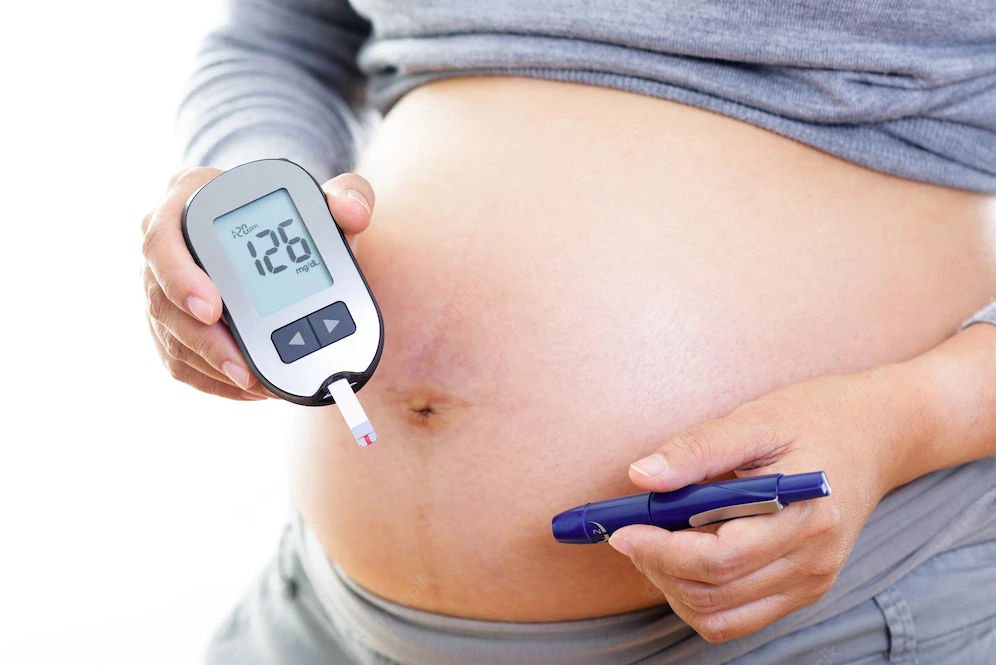
Pregnancy and diabetes, what not to do?
Pregnancy diabetes or Gestational diabetes: This is a condition where high blood sugars in blood are found for the first-time during pregnancy. Gestational diabetes imposes risk for delivery and the baby. A mother with Gestational diabetes is at a higher risk of developing type 2 diabetes.
During pregnancy, a temporary organ develops to connect the mother and the fetus called the placenta. The placenta supplies nutrients and oxygen to the fetus. Placenta secret the number of hormones that are required during pregnancy. Some of these hormones impair the action of insulin, making it less effective. The insulin counteracting effect usually begins at about 20 to 24 weeks of pregnancy and becomes more prominent in the last couple of months. The pancreas produces more insulin to adjust the levels but in some cases the amount of secretion of placental hormones is too much that pancreas cannot overcome it, which leads to gestational diabetes.
Risk factors for gestational diabetes:
Obesity
Familial history of diabetes
Personal history of diabetes or pre-diabetes
Pregnancy after 30 years of age
Previous history of delivery of large babies
Maintaining your blood sugar level is important before, during, and after pregnancy is essential. gestation diabetes usually resolves on its own after delivery; complications may arise if the condition is severe and or poorly managed. These are some complications of gestational diabetes:
Premature delivery
An overly large size baby
Miscarriage
Preeclampsia (pregnancy-related high blood pressure)
Stillbirths
Cesarean delivery or C- section
Poor health of the baby
Long-term risk for mother
How to control gestational diabetes?
Educate yourself: Knowing the difference between normal and high blood sugar level is important factor if you are diagnosed with diabetes during your pregnancy. Your fasting blood sugar level that is empty stomach should be less than 95 mg/dl (milligrams per decilitre). Your post prandial blood sugar level (2 hours after a meal) should be less than 120 mg/dl. (Check these values as per your condition with your gynaecologist). Self-monitoring of blood glucose levels is important in gestational diabetes so that you can adjust your diet according to it. A blood glucometer is a device that measures your blood sugar level with just a drop of blood from your finger. Check your blood sugar level and keep a record. If blood sugar levels are coming high persistently, then contact your doctor.
Diet: Glucose is an energy source required for the growth of the baby as well as it is required to keep up with body needs during pregnancy. Maintain a timetable for your daily food intake. Plan to eat 3 meals and two to three snacks. Eating too much at a time will increase your blood sugar level. Watch your portions; one cup of rice, 2 rotis or bread per meal is reasonable. Fruits have natural sugar and light fructose, and source of vitamins and minerals. During snack time consume fruits as per the size, like at a time a small fruit or half of a large fruit, or one cup serving of a combination of fruits. Avoid canned and preserved fruit juices, and eat only fresh fruits. Do not eat junk food, ready eat from packets like cookies, chips, etc to fulfill your pregnancy cravings.
Breakfast is an essential meal to regulate your blood sugar level. Due to diabetes blood, sugar levels are high before you eat in the morning. The best way is to include proteins and high fiber like whole grains into your breakfast. These will digest slowly and maintain your blood sugar levels. Dry cereals, fruits, and milk will digest quickly and give rise to high blood sugar levels in the morning. Always prefer freshly cooked homemade food.
Milk consumption should be 8 ounces at a time. Drinking more milk at a time will lead to high blood sugars as milk is digested quickly. Do not add sugar, honey, or syrups to your milk.
Maintain a healthy lifestyle: Healthy lifestyle will help you control blood sugar levels.
· Eliminate stress factors.
· Take proper 8 hours of sleep.
· Plan your meal after every two to three hours.
· Brisk walking or any other type of exercise, yoga will be beneficial.
· Practice Meditation, it has its own benefit in all aspects.
· Indulge in some hobbies like reading, music, swimming, or sports.
· While working, avoid sitting for long hours, and take short breaks.
· Alcohol and smoking should be quit to take control of diabetes.
Follow-up visits: Do visit your gynecologist, for regular diabetes screening and growth and development of the baby. Update them about your blood sugar record. Take your diabetes medications regularly. Women with gestational diabetes are more likely to cause type-2 diabetes in their lifetime, or diabetes in their next pregnancy, therefore regular screening of diabetes is important after delivery.
It is possible to deliver a healthy baby, albeit if you have pregnancy-associated diabetes. So do not worry consult your doctor for expert advice.